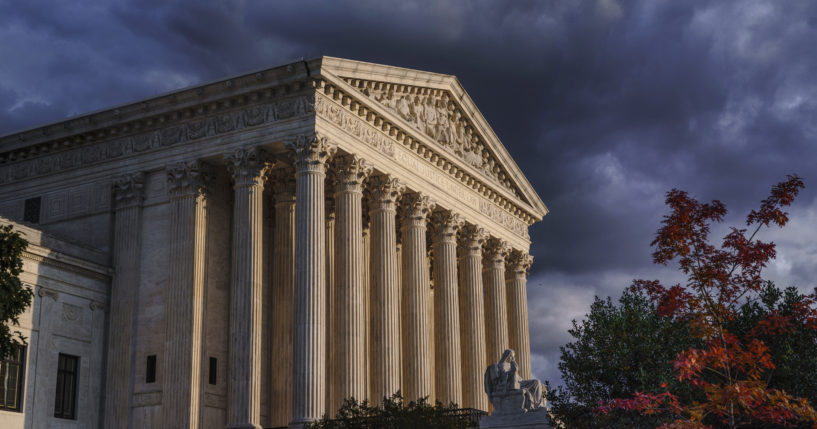
Supreme Court Allows Texas Pro-Life Law to Remain in Effect, Dismisses Biden Administration Challenge
On Friday, the Supreme Court left in place Texas’ ban on most abortions, but ruled that clinics can sue over the state’s most restrictive abortion law — the strictest in the nation.
The court acted more than a month after hearing arguments over the law that makes abortion illegal after cardiac activity is detected in an embryo. That’s around six weeks, which opponents argue is before some women even know they are pregnant. There are no exceptions for the law.
The law has been in place for more than three months, going into effect on Sept. 1.
The same federal judge who already has once blocked the law, known as S.B. 8, almost certainly will be asked to do so again. Then his decision would be reviewed by the 5th U.S. Circuit Court of Appeals, which has twice voted to allow enforcement of the abortion ban.
The case could return to the justices, and so far there have not been five votes on the nine-member court to put the law on hold while the legal fight plays out.
The court’s conservative majority also seems likely to roll back abortion rights in a Mississippi case that was argued last week, although that decision is not expected until the spring.
The high court ruling came a day after a state court judge in Texas ruled that the law’s enforcement, which rewards lawsuits against violators by awarding judgments of $10,000, is unconstitutional but left the law in place.
Thursday’s Supreme Court vote was 8 to 1 in favor of allowing the lawsuit against the ban to proceed, with only Justice Clarence Thomas voting the other way. Justice Neil Gorsuch, who has consistently voted against abortion rights, wrote the court’s main opinion.
The court fight over the Texas law is focused on its unusual structure and whether it improperly limits how the law can be challenged in court. Texas lawmakers handed responsibility for enforcing the law to private citizens, rather than state officials.
The law authorizes lawsuits against clinics, doctors and anyone who “aids or abets” an abortion performed after cardiac activity is detected.
The case raised a complex set of issues about who, if anyone, can sue over the law in federal court, the typical route for challenges to abortion restrictions. Indeed, federal courts routinely put a hold on similar laws, which rely on traditional enforcement by state and local authorities.
The court was divided 5-4, with conservatives in the majority, on another knotty issue, whom to target with a court order that ostensibly tries to block the law. The court ruled that Texas licensing officials may be sued but dismissed claims against state court judges, court clerks and Attorney General Ken Paxton.
Gorsuch wrote that abortion providers have to follow the same rules that apply to people asserting other constitutional rights. “The Court has consistently applied these requirements whether the challenged law in question is said to chill the free exercise of religion, the freedom of speech, the right to bear arms, or any other right. The petitioners are not entitled to a special exemption,” Gorsuch wrote.
Chief Justice John Roberts and the three liberal justices dissented from that part of the decision in an opinion that said the purpose of the Texas law was “to nullify this court’s rulings” on abortion.
Roberts called on U.S. District Judge Robert Pitman, whose earlier order blocking the law was overturned by the appeals court, to “enter appropriate relief without delay.”
Since it took effect in September, the law has imposed the most restrictive abortion curbs in the nation since the Supreme Court first declared a woman’s right to an abortion in its 1973 Roe v. Wade decision.
In its first month of operation, a study published by researchers at the University of Texas found that the number of abortions statewide fell by 50% compared with September 2020. The study was based on data from 19 of the state’s 24 abortion clinics, according to the Texas Policy Evaluation Project.
The justices declined to block the law once before, voting 5-4 in September to let it take effect. At the time, the three appointees of former President Donald Trump and two other conservative colleagues formed the majority.
Following the September vote, the Justice Department filed its own lawsuit over the Texas law. The justices on Friday dismissed that suit, which raised a separate set of thorny legal issues.
The Western Journal has reviewed this Associated Press story and may have altered it prior to publication to ensure that it meets our editorial standards.
Truth and Accuracy
We are committed to truth and accuracy in all of our journalism. Read our editorial standards.
Advertise with The Western Journal and reach millions of highly engaged readers, while supporting our work. Advertise Today.












